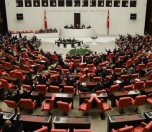Click to read the article in Turkish
The draft judicial reform package that has been prepared by the ruling Justice and Development Party (AKP) includes plea bargaining.
The implementation of plea bargaining, which the pro-government daily Sabah reported as "US model for prosecutors", will pave the way for a suspect to receive a reduced sentence determined by the prosecutor without the case being brought to the court.
The police will be able to take part in "informing" stage
In the draft article which is not yet finalized, the application is called "rapid/serial judgment."*
Accordingly, the prosecutor or law enforcement officers will inform the suspect. If the suspect accepts the rapid judgment, the prosecutor will determine a sentence between the upper and the lower limits of the offense and half of that sentence will be applied.
The prosecutor will propose to suspect the application of the procedure of rapid judgment. The suspect must accept the offer before his lawyer in order to proceed.
Then the prosecutor will request the application of the serial procedure from the relevant court. If the court considers that the necessary conditions have taken place and that the action is within the scope of rapid judgment, it will establish judgment in accordance with the sanction specified by the prosecutor.
Otherwise, it will reject the request and send the file to the prosecutor for investigation according to the general provisions. If the request is rejected, the suspect's statements will not be considered the evidence and will not be used in the future.
This procedure will not be applicable in organized crimes unless all the suspects agree.
Plea bargaining caused more than 360 incorrect convictions
We frequently read about scandals about plea bargaining in the US such as "forced admission of the crime through psychological or physical torture methods" or "threatening suspects with higher punishments to make them confess and blackmailing and punishing the suspect on the basis of this confession ".
The Innocence Project, established to defend the rights of those who were convicted despite being not guilty, seeks an answer to the question, "Why would someone confess a crime that she/he did not commit?"
One example is the story of Chris Ochoa. Ochoa confessed that he was guilty of murder was sentenced to life imprisonment in Texas in 1988. He was in prison until 2002 when he was cleared after the confession of the real criminal and the DNA evidence supported it. In this video, he explains how the police forced him to take the offense and threatened him with a death sentence.
Why did they confess the crimes they didn't commit?
According to research findings, the suspects confess crimes "because of the torture, threats and blackmails of law enforcement officers; because they do not know their legal rights or are misinformed; because they are convinced by false evidence; and because they are afraid to face greater punishment."
According to the information given here, more than 360 convictions in the US proved to be inaccurate by DNA testing, and some of these convictions were based on false confessions.
There is no reason for the methods the police already use not to be applied for forcing suspects to confess a crime.
Netflix also has a documentary on coerced confessions, titled, "Confession Tapes."
For which crimes plea bargaining will be applicable?
Article 250 of the draft, titled, "Rapid judgment proceedings" regulates the implementation of plea bargaining. Accordingly, plea bargaining will be applicable for several offenses including intentionally endangering general security (Article 170 of the Turkish Penal Code), endangering traffic security (Article 179), money counterfeiting, providing place and means for gambling (Article 228), using the identity card of another person (Article 268). (AS/VK)
*The Turkish word "seri" means both "serial" and "rapid" in English and there is an ambiguity in what the ministry meant by it. (AS/VK)














